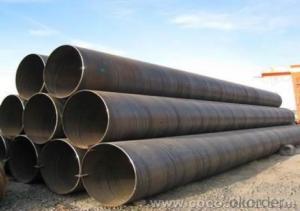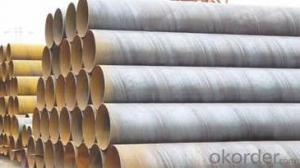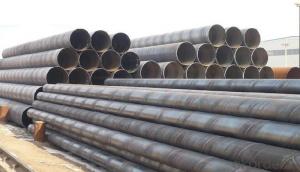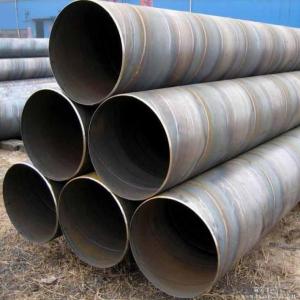SPIRAL STEEL PIPE 34’‘ ASTM API LARGE DIAMETER PIPE
- Loading Port:
- Tianjin
- Payment Terms:
- TT OR LC
- Min Order Qty:
- 5 m.t.
- Supply Capability:
- 3000 m.t./month
OKorder Service Pledge
OKorder Financial Service
You Might Also Like
Packaging & Delivery
Packaging Detail: | standard export packing or as customer's requirement |
Delivery Detail: | within 10 - 30 days |
Specifications
Spiral Welded Steel Pipes and Tubes
1.Material:Q195-Q235
2.Length:1-12m
3.WT:1.0-14mm
4.O.D.:20-273mm
Spiral Welded Steel Pipes and Tubes
Product Description:
1.Material : Q235,Q345,L245,L290,L360,L415,L450,L485,GrB,X42,46,X52,X56,X60,X65,X70,X80,X100
2,Standard: SY/T5037-2000,GB/T9711-2011,API Spec 5L PSL1/PSL2,ASTM A252\A53,ISO3183,DIN17172,EN10217,JIS G3457,AWWA C200,ASTM A139,ASTM A671,ASTM A672
3.Wall thickness: 3.0mm-30mm
4.Outer diameter: φ168mm-3020mm
5,Length: 5m-12m or as your requirement
6,Corrosion protection standard: DIN30670,DIN30671, AWWAC210, AWWA C203, SY/T0413-2002,SY/T0414-2002
7,Application: Oil, gas, natural gas, water pipe, thermal electricity pipe, steel structure engineering, etc
Q195-q345 Material Steel Pipe's Materials
Elements | Chemical Compsition% | Mechanical Property | ||||||
C% | Mn% | S% | P% | Si% | Yield Point (Mpa) | Tensile Strength(Mpa) | Elongation | |
Q195 | 0.06-0.12 | 0.25-0.50 | <0.050< span=""> | <0.045< span=""> | <0.030< span=""> | >195 | 315-430 | 32-33 |
Q215 | 0.09-0.15 | 0.25-0.55 | <0.05< span=""> | <0.045< span=""> | <0.030< span=""> | >215 | 335-450 | 26-31 |
Q235 | 0.12-0.20 | 0.30-0.70 | <0.045< span=""> | <0.045< span=""> | <0.030< span=""> | >235 | 375-500 | 24-26 |
Q345 | <0.20< span=""> | 1.0-1.6 | <0.040< span=""> | <0.040< span=""> | <0.55< span=""> | >345 | 470-630 | 21-22 |
- Q:How are steel pipes insulated to prevent noise transmission?
- Steel pipes are typically insulated to prevent noise transmission through the use of materials such as mineral wool, fiberglass, or foam. These insulation materials are wrapped around the pipes to create a barrier that absorbs and reduces sound waves, preventing them from traveling and causing noise transmission.
- Q:What are the different strategies for pipe laying using steel pipes?
- There are several strategies for pipe laying using steel pipes, each suited for different environments and requirements. Here are some of the commonly used strategies: 1. Open Trench: This is the most traditional and widely used method, where a trench is dug along the desired pipeline route. Steel pipes are then laid in the trench, aligned, and welded together. This method allows for easy access, maintenance, and repair of the pipeline. 2. Direct Pipe: This method is used when there are crossings under obstacles such as rivers or highways. It involves drilling a borehole from one side to the other, while simultaneously laying the steel pipe. The pipe is then pulled through the borehole, creating a continuous pipeline. 3. Horizontal Directional Drilling (HDD): HDD is employed when the pipeline needs to be installed under existing infrastructure or environmentally sensitive areas. A pilot hole is drilled horizontally, and the steel pipe is then pulled through the hole using a reaming tool. This technique minimizes disruption to the surface and reduces environmental impact. 4. Sliplining: Sliplining involves inserting a smaller diameter steel pipe into an existing larger pipe. The smaller pipe is pushed or pulled into the larger pipe, providing a new corrosion-resistant lining. This method is commonly used for rehabilitating deteriorated or damaged pipelines. 5. Microtunneling: Microtunneling is similar to HDD, but it involves a microtunnel boring machine (MTBM) that excavates the soil and installs the steel pipe simultaneously. This method is often used for precision pipe laying, especially in urban areas with limited space. 6. Jacking: Jacking, also known as pipe jacking or pipe ramming, is utilized for installing steel pipes in soil conditions that are not suitable for open trenching. This method involves pushing the steel pipe into the ground using hydraulic jacks or pneumatic rams. It is commonly used for crossing under railways, roads, or buildings. 7. Offshore Pipeline Laying: For subsea applications, steel pipes can be laid using a variety of techniques, such as S-lay, J-lay, or reel-lay. These methods involve deploying the pipeline from a vessel, either vertically or at an inclined angle, and welding the steel pipes together as they are lowered to the seabed. Each of these strategies has its own advantages and considerations, depending on factors such as terrain, environmental impact, existing infrastructure, and project requirements. It is important to carefully evaluate these factors and select the most suitable pipe laying strategy to ensure the safe and efficient installation of steel pipes.
- Q:What are the applications of steel pipes?
- Steel pipes have a wide range of applications in various industries due to their durability, strength, and versatility. Some of the common applications of steel pipes include: 1. Plumbing and water distribution: Steel pipes are commonly used in plumbing systems to transport water and other fluids. They are resistant to corrosion and can withstand high pressure, making them ideal for water distribution networks in residential, commercial, and industrial buildings. 2. Oil and gas industry: Steel pipes are extensively used in the oil and gas industry for the transportation of oil, natural gas, and other petroleum products. They are able to handle high-pressure and high-temperature environments, making them crucial in drilling, production, and refining processes. 3. Construction and infrastructure: Steel pipes are widely employed in construction projects for various purposes such as structural support, foundations, scaffolding, and underground piping systems. They provide a strong and reliable framework for buildings, bridges, tunnels, and highways. 4. Industrial applications: Steel pipes are used in various industrial applications such as manufacturing, power plants, chemical processing, and food processing. They are often used to transport liquids, gases, or slurries within the production processes or to transfer heat in heat exchangers and condensers. 5. Agricultural sector: Steel pipes are commonly used in the agricultural sector for irrigation systems, particularly in large-scale farming. They are used to transport water from a water source to the fields, ensuring efficient and controlled water distribution. 6. Mining industry: Steel pipes are utilized in the mining industry for the extraction and transportation of minerals, ores, and other mining materials. They are resistant to abrasion and corrosion, making them suitable for the harsh and demanding conditions of mining operations. 7. Mechanical and automotive applications: Steel pipes find application in the manufacturing of various mechanical components, such as automotive exhaust systems, hydraulic cylinders, and precision tubing. They offer high strength, dimensional stability, and resistance to impact and vibration. 8. Infrastructure and utilities: Steel pipes are commonly used in infrastructure projects for the transportation of sewage, stormwater, and wastewater. They are durable, resistant to chemical corrosion, and can withstand underground conditions, making them suitable for sewer and drainage systems. In summary, the applications of steel pipes are vast and diverse, ranging from plumbing and water distribution to oil and gas industry, construction, agriculture, mining, mechanical and automotive sectors, and infrastructure projects. Their robustness, versatility, and ability to withstand extreme conditions make them a fundamental component in numerous industries.
- Q:What are the different methods of protecting steel pipes from external damage?
- There are several methods of protecting steel pipes from external damage, including coating the pipes with a corrosion-resistant material such as epoxy or polyethylene, applying a layer of protective tape, installing a cathodic protection system, using concrete or rock shielding, and implementing measures to prevent soil movement or impact damage.
- Q:What is the difference between the stainless steel pipe welded pipe and seamless pipe?
- Seamless tube is a strip of steel with a hollow cross section and no seams at all. The general is rolled into a cylindrical tube plate welding.
- Q:What are the specific differences between flexible pipes and rigid pipes?
- Structurally:A rigid waterproof sleeve is welded with a water stop ring outside the steel pipe;The flexible waterproof casing pipe is welded on the outside of the 3 side wing ring, 4 screw buckle, inside a welding piece with a rubber ring, the outside and do a flange, with 4 double head bolt, welding a steel pipe, the pipe installed, the flange is installed. The screw fastening, tightening the apron is bigger, more Water Leakage, generally in the waterproof requirements of relatively high places, such as the pool of water.
- Q:Can steel pipes be used for underground geothermal systems?
- Yes, steel pipes can be used for underground geothermal systems. Steel pipes are commonly used in geothermal applications due to their durability, strength, and resistance to corrosion. They can withstand high temperatures and pressures associated with geothermal systems, making them suitable for underground installations. Additionally, steel pipes are readily available and cost-effective, making them a popular choice in geothermal projects.
- Q:How are steel pipes used in the manufacturing of telecommunications infrastructure?
- Steel pipes are commonly used in the manufacturing of telecommunications infrastructure for various purposes such as underground cable protection, overhead cable support, and antenna mounting. They provide durability, strength, and corrosion resistance, ensuring the longevity and reliability of the infrastructure. Additionally, steel pipes allow for easy installation and maintenance of telecommunications equipment, making them an essential component in the industry.
- Q:How are steel pipes used in the manufacturing of shipbuilding?
- Steel pipes are used in the manufacturing of shipbuilding primarily for their strength, durability, and corrosion resistance. They are commonly used in various applications such as the construction of hulls, decks, bulkheads, and piping systems within the ship. The pipes are used for carrying fluids, gases, and other materials throughout the vessel, ensuring efficient operation and safety. Additionally, steel pipes are crucial for the installation of essential systems like water supply, fire-fighting, heating, and ventilation, contributing to the overall functionality and structural integrity of the ship.
- Q:What are the advantages of using stainless steel pipes?
- There are several advantages of using stainless steel pipes. Firstly, stainless steel pipes have excellent corrosion resistance, making them suitable for various industries, including water supply, chemical processing, and oil and gas. Secondly, they have high strength and durability, allowing them to withstand extreme temperatures and pressure. Additionally, stainless steel pipes are hygienic and easy to clean, making them ideal for applications in the food and beverage industry. Lastly, they have a long lifespan and require minimal maintenance, resulting in cost savings in the long run.
1. Manufacturer Overview |
|
|---|---|
| Location | |
| Year Established | |
| Annual Output Value | |
| Main Markets | |
| Company Certifications | |
2. Manufacturer Certificates |
|
|---|---|
| a) Certification Name | |
| Range | |
| Reference | |
| Validity Period | |
3. Manufacturer Capability |
|
|---|---|
| a)Trade Capacity | |
| Nearest Port | |
| Export Percentage | |
| No.of Employees in Trade Department | |
| Language Spoken: | |
| b)Factory Information | |
| Factory Size: | |
| No. of Production Lines | |
| Contract Manufacturing | |
| Product Price Range | |
Send your message to us
SPIRAL STEEL PIPE 34’‘ ASTM API LARGE DIAMETER PIPE
- Loading Port:
- Tianjin
- Payment Terms:
- TT OR LC
- Min Order Qty:
- 5 m.t.
- Supply Capability:
- 3000 m.t./month
OKorder Service Pledge
OKorder Financial Service
Similar products
New products
Hot products
Related keywords
































